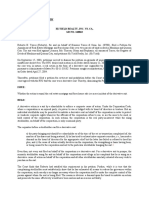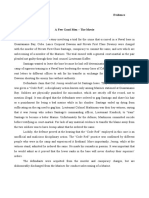56 - Del Rosario v. NLRC
56 - Del Rosario v. NLRC
Uploaded by
Joshua RiveraCopyright:
Available Formats
56 - Del Rosario v. NLRC
56 - Del Rosario v. NLRC
Uploaded by
Joshua RiveraOriginal Description:
Original Title
Copyright
Available Formats
Share this document
Did you find this document useful?
Is this content inappropriate?
Copyright:
Available Formats
56 - Del Rosario v. NLRC
56 - Del Rosario v. NLRC
Uploaded by
Joshua RiveraCopyright:
Available Formats
Del Rosario v.
NLRC (85416, July 24, 1990)
Facts:
The POEA dismissed a complaint for money claims for lack of merit. The decision was appealed to the
NLRC, which reversed the decision and ordered Philsa Construction and Trading Co., Inc. (the recruiter)
and Arieb Enterprises (the foreign employer) to jointly and severally pay Atienza salary differentials and
vacation leave benefits. The Supreme Court dismissed the appeal and entry of judgment was made.
A writ of execution was issued by the POEA but it was returned unsatisfied as Philsa was no longer
operating and was financially incapable of satisfying the judgment. However, another corporation, Philsa
International Placement & Services Corp., composed of practically the same set of stockholders, was
registered as a licensed private employment agency.
Atienza moved for the issuance of an alias writ against the officers of Philsa. This was opposed by the
officers, led by Del Rosario, the president and general manager. The POEA ordered that an alias writ of
execution be issued against the properties of Del Rosario. The NLRC dismissed the appeal.
Issue:
Whether or not Del Rosario may be held liable for the unpaid obligation of Philsa
Held:
No, Del Rosario could not be held liable. For the separate juridical personality of a corporation to be
disregarded, the wrongdoing must be clearly and convincingly established. It cannot be presumed.
The NLRC's decision is wanting in establishing the wrongdoing. The conclusion that Philsa allowed its
license to expire to evade payment of private respondent's claim is not supported by facts. At the time
Philsa allowed its license to lapse in 1985 and even at the time it was delisted in 1986, there was yet no
judgment in favor of Atienza, which were actually made in 1988. An intent to evade payment of his claims
cannot therefore be implied from the expiration of its license and its delisting. Neither will the
organization of Philsa International Placement & Services Corp. imply fraud since it was organized and
registered in 1981, several years before Atienza filed his complaint with the POEA in 1985. The creation
of the second corporation could not have been in anticipation of Atienza's money claims.
Forgoing considered, Philsa's corporate personality remains inviolable. Here, not only has there been a
failure to establish fraud, but it has also not been shown that Del Rosario is the corporate officer
responsible for Atienza’s predicament. Thus, the former could not be held liable.
You might also like
- Aro v. NañawaDocument3 pagesAro v. NañawaJoshua RiveraNo ratings yet
- 4 - Case DigestDocument32 pages4 - Case DigestJoshua RiveraNo ratings yet
- Del Rosario vs. NLRC, 187 SCRA 777 (1990)Document2 pagesDel Rosario vs. NLRC, 187 SCRA 777 (1990)RoanneNo ratings yet
- Del Rosario Vs NLRC 187 SCRA 777Document1 pageDel Rosario Vs NLRC 187 SCRA 777Chino CabreraNo ratings yet
- 12 Del Rosario Vs NLRCDocument1 page12 Del Rosario Vs NLRCcarlo_tabangcuraNo ratings yet
- Del Rosario vs. NLRCDocument1 pageDel Rosario vs. NLRCanajuanito0% (1)
- 74 - Del Rosario v. NLRCDocument2 pages74 - Del Rosario v. NLRCRoi RedNo ratings yet
- Republic of The Philippines Vs Iglesia Ni Cristo (March 1984)Document5 pagesRepublic of The Philippines Vs Iglesia Ni Cristo (March 1984)Maria Cristina MartinezNo ratings yet
- Del Rosario VS NLRCDocument3 pagesDel Rosario VS NLRCImariNo ratings yet
- Commercial Law Lecture 26-02-2019Document5 pagesCommercial Law Lecture 26-02-2019เจียนคาร์โล การ์เซียNo ratings yet
- Corp 7Document35 pagesCorp 7James TanNo ratings yet
- Case Digest On Corpo LawDocument19 pagesCase Digest On Corpo LawJustin IsidoroNo ratings yet
- Case Digest - Amoroso vs. Vantage Drilling International and Group of CompaniesDocument2 pagesCase Digest - Amoroso vs. Vantage Drilling International and Group of CompaniesBizmates Jess ANo ratings yet
- Facts:: Benedicto Hornilla and Atty. Federico D. Ricafort, vs. Atty. Ernesto S. SalunatDocument6 pagesFacts:: Benedicto Hornilla and Atty. Federico D. Ricafort, vs. Atty. Ernesto S. SalunatFrancis DiazNo ratings yet
- Revised Corpo QandADocument17 pagesRevised Corpo QandAJA FranciscoNo ratings yet
- Gregorio Azcor (Corp)Document7 pagesGregorio Azcor (Corp)Archie MancolNo ratings yet
- Steelcase Inc Vs DISIDocument3 pagesSteelcase Inc Vs DISIana ortizNo ratings yet
- Corporation Law Digests (Sec1 - 10) UPDATED 112912Document95 pagesCorporation Law Digests (Sec1 - 10) UPDATED 112912Paul Angelo TombocNo ratings yet
- 16-19 Second ListDocument3 pages16-19 Second ListMarconJacobLisingNo ratings yet
- Corpo Cases DigestDocument10 pagesCorpo Cases DigestAllenMarkLuperaNo ratings yet
- Philippine Export and Foreign Loan Guarantee V CADocument9 pagesPhilippine Export and Foreign Loan Guarantee V CAMicahChooNo ratings yet
- Good Earth Emporium Inc and Lim Ka Ping, Petitionersv - CA and Roces-Reyes Realty Inc., RespondentsDocument26 pagesGood Earth Emporium Inc and Lim Ka Ping, Petitionersv - CA and Roces-Reyes Realty Inc., RespondentsMarGon MartelNo ratings yet
- CASESDocument5 pagesCASESBea BangcolaNo ratings yet
- Lexoterica - SC Rulings On Commercial LawDocument317 pagesLexoterica - SC Rulings On Commercial LawBelenReyesNo ratings yet
- CORPO - 64. Eriks v. CADocument1 pageCORPO - 64. Eriks v. CARS SuyosaNo ratings yet
- Corpo Digest Set 1Document8 pagesCorpo Digest Set 1Darlene Ganub100% (1)
- Traders Royal Bank v. Court of AppealsDocument2 pagesTraders Royal Bank v. Court of AppealsRianne SantosNo ratings yet
- Pvta vs. Cir and Monte de PiedadDocument3 pagesPvta vs. Cir and Monte de PiedadThomas Vincent O. PantaleonNo ratings yet
- Facts:: Francisco V. Del Rosario, Petitioner, Vs - National Labor Relations Commission - Writ of Execution Expired LicenseDocument2 pagesFacts:: Francisco V. Del Rosario, Petitioner, Vs - National Labor Relations Commission - Writ of Execution Expired LicenseMichelle Joy ItableNo ratings yet
- 30 Palay, Inc. vs. ClaveDocument2 pages30 Palay, Inc. vs. ClaveLoren Bea TulalianNo ratings yet
- Set1 DigestsDocument36 pagesSet1 DigestsJonna Maye Loras CanindoNo ratings yet
- Hi-Yield Realty, Inc. vs. CaDocument2 pagesHi-Yield Realty, Inc. vs. CaNovelyn Kidd100% (1)
- Republic V CoalbrineDocument3 pagesRepublic V CoalbrineCecille SaritaNo ratings yet
- Francisco Motors Corp. v. Court of Appeals, 309 SCRA 72 (1999)Document23 pagesFrancisco Motors Corp. v. Court of Appeals, 309 SCRA 72 (1999)inno KalNo ratings yet
- Political Law Digested CasesDocument26 pagesPolitical Law Digested CasesMark Jhones LicardoNo ratings yet
- 3.2.1 Excellent Quality Apparel V Win Multi Rich BuildersDocument2 pages3.2.1 Excellent Quality Apparel V Win Multi Rich BuildersJepoy FranciscoNo ratings yet
- Yvette Revised Position PaperDocument10 pagesYvette Revised Position PaperChristoffer Allan LiquiganNo ratings yet
- Salvattiera Vs GarlitosDocument2 pagesSalvattiera Vs GarlitosHazel Joy Galamay - Garduque100% (1)
- What Constitutes Doing Business in The PhilippinesDocument3 pagesWhat Constitutes Doing Business in The PhilippinesVictoria EscobalNo ratings yet
- Prince Transport Inc v. GarciaDocument4 pagesPrince Transport Inc v. GarciaKristine Mutia100% (1)
- Cases 2 Atty Yen Mendoza 1. Municipality of Malabang vs. Benito (1969)Document4 pagesCases 2 Atty Yen Mendoza 1. Municipality of Malabang vs. Benito (1969)yenNo ratings yet
- 194 SCRA 544 (GR No. 82797 February 27, 1991) : 1.) Good Earth Emporium Inc. Vs Court of AppealsDocument15 pages194 SCRA 544 (GR No. 82797 February 27, 1991) : 1.) Good Earth Emporium Inc. Vs Court of AppealsDavid Anthony PadreNo ratings yet
- Partnership Agency Case DigestsDocument45 pagesPartnership Agency Case DigestsKia Bi100% (2)
- Separate Juridical Personality and The Doctrine of Piercing The Veil of Corporate FictionDocument48 pagesSeparate Juridical Personality and The Doctrine of Piercing The Veil of Corporate Fictionapril aranteNo ratings yet
- Case Digest Start Asia Banking Corp. Vs Standard Products Co.Document6 pagesCase Digest Start Asia Banking Corp. Vs Standard Products Co.Cams Villamor Lape100% (1)
- RAMON P. JACINTO and JAIME J. COLAYCO, Petitioners, vs. FIRST WOMENS CREDIT CORPORATION, Represented in This Derivative Suit by SHIG KATAYAMA, RespondentsDocument6 pagesRAMON P. JACINTO and JAIME J. COLAYCO, Petitioners, vs. FIRST WOMENS CREDIT CORPORATION, Represented in This Derivative Suit by SHIG KATAYAMA, RespondentsVic Cajurao0% (1)
- Case #4 People of The Philippines, V. Angel Mateo Y Jacinto and Vicenta Lapiz Y Medina G.R. No. 198012, April 22, 2015 DoctrinesDocument6 pagesCase #4 People of The Philippines, V. Angel Mateo Y Jacinto and Vicenta Lapiz Y Medina G.R. No. 198012, April 22, 2015 DoctrineseenahNo ratings yet
- 2010 Labor Case DigestDocument42 pages2010 Labor Case DigestDiana Bagangan0% (1)
- Partnership CaseDocument15 pagesPartnership CasenheldelaraNo ratings yet
- Manalo Vs Roldan-ConfesorDocument7 pagesManalo Vs Roldan-ConfesorEileen Eika Dela Cruz-Lee0% (1)
- Litton Mills Vs CADocument3 pagesLitton Mills Vs CAGretel Salley-ObialNo ratings yet
- Corporation CasesDocument9 pagesCorporation CasesKfMaeAseronNo ratings yet
- FILIPINAS PORT v. GODocument5 pagesFILIPINAS PORT v. GORal CaldiNo ratings yet
- Gagui Vs DejeroDocument2 pagesGagui Vs DejeroHEART NUQUENo ratings yet
- Concept Builders VS NLRCDocument7 pagesConcept Builders VS NLRCGhifari MustaphaNo ratings yet
- Corpo Cases On Fraud, Alter Ego and EquityDocument22 pagesCorpo Cases On Fraud, Alter Ego and EquityRegion PersonnelNo ratings yet
- Communication Materials and Design vs. CaDocument4 pagesCommunication Materials and Design vs. CaAbigail PanongNo ratings yet
- Oblicon Digests (Finals1)Document21 pagesOblicon Digests (Finals1)Concon FabricanteNo ratings yet
- (G.R. No. 171428) Article (1338-1344)Document4 pages(G.R. No. 171428) Article (1338-1344)Marjorie G. EscuadroNo ratings yet
- "Conflict of Interest" of Corporate LawyersDocument29 pages"Conflict of Interest" of Corporate LawyersJeff FernandezNo ratings yet
- DigestDocument33 pagesDigestJon JamoraNo ratings yet
- 116 - Japanese War Notes Claimants Association of The PhilippinesDocument1 page116 - Japanese War Notes Claimants Association of The PhilippinesJoshua RiveraNo ratings yet
- Corpo DigestsDocument31 pagesCorpo DigestsJoshua RiveraNo ratings yet
- Film Synopsis - A Few Good MenDocument1 pageFilm Synopsis - A Few Good MenJoshua RiveraNo ratings yet
- 140 - Won v. Wack Wack Golf & Country Club, Inc.Document1 page140 - Won v. Wack Wack Golf & Country Club, Inc.Joshua RiveraNo ratings yet
- QADocument79 pagesQAJoshua RiveraNo ratings yet
- 104 - Powers V MarshallDocument1 page104 - Powers V MarshallJoshua RiveraNo ratings yet
- 128 - Uson v. DiosomitoDocument1 page128 - Uson v. DiosomitoJoshua RiveraNo ratings yet
- 5 - Case DigestDocument29 pages5 - Case DigestJoshua RiveraNo ratings yet
- 80 - Western Institute of Technology v. SalasDocument2 pages80 - Western Institute of Technology v. SalasJoshua RiveraNo ratings yet
- Bognot v. Pini and Coca-Cola Femsa v. MacapagalDocument2 pagesBognot v. Pini and Coca-Cola Femsa v. MacapagalJoshua RiveraNo ratings yet
- 92 - San Miguel Corporation v. KhanDocument1 page92 - San Miguel Corporation v. KhanJoshua RiveraNo ratings yet
- Employer-Employee Relationship CasesDocument179 pagesEmployer-Employee Relationship CasesJoshua RiveraNo ratings yet
- 1 - Obligations of The Seller - Case DigestDocument24 pages1 - Obligations of The Seller - Case DigestJoshua RiveraNo ratings yet
- Non-Current Assets Held For Sale and Discontinued OperationsDocument20 pagesNon-Current Assets Held For Sale and Discontinued OperationsJoshua RiveraNo ratings yet











































































